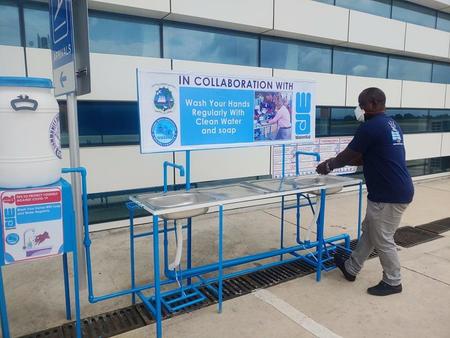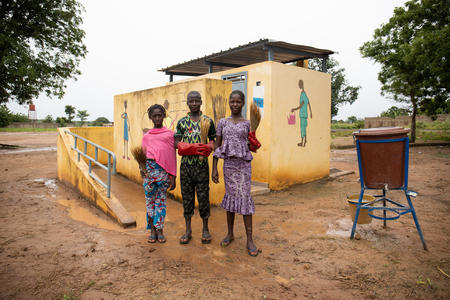How improving hygiene in West Africa will protect against Ebola, COVID-19 and other health crises

As West Africa records a new Ebola outbreak, Maisie-Rose Byrne emphasises that now is the time for governments to act and make this a turning point for hygiene and public health, drawing on our new report on the state of the region's hygiene.
Ebola is back – three words that nobody wanted to hear. As WaterAid West Africa publishes its regional state of hygiene report, it’s a sobering reminder of the ongoing threats faced in a region where only 35% of people have access to basic handwashing facilities at home.
On 14 February, just shy of a year since the first cases of COVID-19 in the region, Guinea declared an Ebola epidemic after three people died and four others fell ill in the rural southeast of the country. It is the first reported outbreak in West Africa since a region-wide pandemic ended five years ago after claiming more than 11,000 lives. Sierra Leone and Liberia, which complete the trio with Guinea of the countries that suffered most from Ebola during the deadly 2013–16 outbreak, are on high alert.
Hand hygiene is crucial to preventing transmission of disease
Basic hand hygiene is recommended by the World Health Organization (WHO) as a crucial element of Ebola prevention and control, alongside case management, surveillance and contact tracing, a good laboratory service, safe burials and social mobilisation. However, preparing to respond to an outbreak of another highly transmissible disease when less than 1% of the Liberian population has access to basic handwashing facilities (soap and water) at home is already spreading fear across the region’s weak health systems.
Memories from the last Ebola outbreak still linger. As well as the shocking death toll, it caused economic growth to plummet, and hard-fought development gains to stall. Pius Abdulai, Programmes Manager for WaterAid Liberia, believes investment in hygiene and health measures could have prevented such widespread devastation:
With a strong health system, Liberia would have probably mitigated the spread and impact of Ebola, but weak infrastructure, lack of adequate health resources and poor hygiene behaviour exacerbated the situation.
But have lessons been learned? Christian Lawrence, WaterAid Sierra Leone's Senior Policy and Advocacy Manager, thinks that, while there is a lot to do, the Government there has made some progress:
During the 2016 Ebola outbreak, our Government was delayed in making some vital decisions. But when COVID-19 struck, they took early preventative measures, for example by activating contact tracing and surveillance systems before the first cases even hit our shores. This was really encouraging to see – but we need the same forward planning and prioritisation of hygiene interventions, both to respond effectively now, and to build resilience against future health threats.
Hygiene behaviours are vital beyond crises
The importance of good hygiene practices extends beyond helping to contain the spread of COVID-19 and Ebola. Handwashing with soap and water is among the most effective ways to prevent the spread of many common diseases, protecting lives and livelihoods and saving billions of dollars in associated costs.
Yet, across the region approaches to sustainable hygiene adoption are often weak or failing, leaving millions of people entrenched in unsafe hygiene behaviours and without access to life-saving water and sanitation infrastructure.
Our report: the state of hygiene in West Africa
In our new report we highlight why hygiene is the major foundation of quality health outcomes, together with clean water and basic sanitation. Our research found that the proportion of people in West Africa with access to adequate handwashing facilities remains very low, rarely rising to 40% of the population (in Ghana, Mauritania, Nigeria and Mali). The COVID-19 pandemic has further highlighted the inequalities in access to basic services, both between and within countries.
A major bottleneck in increasing access provision can be attributed to the low political commitment to supporting hygiene interventions. Only four countries out of the 12 we surveyed reported having specific hygiene policies, and we found evidence that even where such policies are in place they are often obsolete and/or poorly implemented.
Compounded by a large financing gap, the persistent absence of budgeting for hygiene issues, and a lack of effective monitoring and evaluation, the state of hygiene in West Africa needs urgent investment and prioritisation.
So, what must governments do to improve hygiene?
1. Urgently and significantly increase investment in hygiene infrastructure and promotion, prioritising those most at risk from COVID-19 and Ebola outbreaks.
2. Strengthen monitoring and accountability processes to ensure hygiene policies are:
- targeting the identified bottlenecks
- implemented effectively and sustainably
- supported by clear national investment plans
3. Increase efficiency of hygiene coordination, including a greater range of stakeholders and scaling up the great innovation we’ve seen during emergency responses to COVID-19.
A turning point for hygiene prioritisation and investment
From recurring cholera outbreaks to the COVID-19 pandemic, to the new threat of a repeat of the devastating effects of Ebola on lives and livelihoods, the importance of good hygiene is clearer now than ever in West Africa.
Handwashing with soap remains the first line of defence against infectious diseases, and a key aspect of the public health advice from WHO for the prevention and control of COVID-19 and Ebola. The current health crisis in the region must be the turning point for hygiene prioritisation and investment.
Maisie-Rose Byrne is Senior Campaigns Officer, West Africa at WaterAid. Follow her on Twitter at @MR3Byrne, and follow WaterAid West Africa at @WaterAidWAfrica.
Top image: Monica walking across the wooden plank from the over-hanging latrine in West Point, Monrovia, Liberia.





